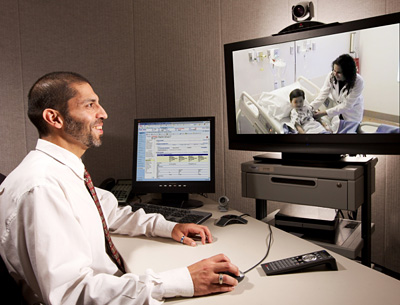Posted Feb. 23, 2011

Lavjay Butani, chief of pediatric nephrology, performs a consult via telemedicine connection.
UC Davis Health System and the California Telehealth Network (CTN) announced today the availability of nearly $6 million to further advance communications technologies for use in health care around the state. In a coordinated effort, the two entities are seeking 15 communities in California to become best-practice examples in the use and integration of technology to improve health and health care for local residents.
Applicants must submit letters of interest via e-mail by March 14, 2011, at 5 p.m. to be eligible for allocations ranging from $300,000 to $500,000 per community. The funds can be used to acquire eHealth technologies and telehealth equipment for connecting with the new medical-grade, broadband system now being established by the CTN. In addition, up to $50,000 will be available to each participant to support community-based training and coordination.
Letters of interest should be sent to btopsba@ucdmc.ucdavis.edu. More information about the application process is available at the Model eHealth Community web page: http://www.ucdmc.ucdavis.edu/cht/initiatives/BTOP/index.html
The funding is part of the Broadband Technology Opportunities Program within the U.S. Department of Commerce, which awarded UC Davis – on behalf of the CTN – more than $9 million in September 2010 to help advance technology-enabled health care in California. In addition, nearly $5 million in matching funds from the California HealthCare Foundation, the National Coalition for Health Integration, United Healthcare and the University of California also are supporting the new program.
 "We are seeking proposals from communities that have a vision and plan for transforming health care and improving health through the use of technology.”
"We are seeking proposals from communities that have a vision and plan for transforming health care and improving health through the use of technology.”
— Thomas Nesbitt
The California Telehealth Network’s goal is to provide managed, sustainable, broadband access to community anchor institutions throughout California. These institutions, connected together through a high-speed network to academic centers, data centers, application service providers and insurers, will form the basis for a technology-enabled health-care system.
"We are seeking proposals from communities that have a vision and plan for transforming health care and improving health through the use of technology,” said Thomas Nesbitt, associate vice chancellor for strategic technologies and alliances at UC Davis and principal investigator for the grant. "Communities using a variety of strategies, including specialty consultations, acute-care monitoring, chronic-disease telehealth and other broadband-enabled solutions, will find this to be an exciting funding opportunity.”
Other best practices and activities that Model eHealth Communities demonstrate also may include a broad array of services such as distance education, online education, patient education and online support groups for chronic-disease management, teledentistry and other health-related illnesses. Among the eligibility criteria for successful applicants is a requirement that a community relies on collaboration and partnerships among diverse organizations and government entities.
“What’s unique about this program is that it places a strong emphasis on long-term sustainability by requiring community partnerships,” said Eric Brown, president and Chief Executive Officer of the California Telehealth Network. “Raising broadband application literacy should be a collaborative effort among health-care providers, community college instructors, public safety and county health officers, local librarians and consumers. Having communities work together can create a truly strong and vibrant system for enhancing health.”
Center for Health and Technology
UC Davis Health System, with its Center for Health and Technology, is a recognized leader for its innovative use of the latest in telecommunications technology to improve the delivery of health care. The health system pioneered the use of telehealth and e-health programs to enable patients from throughout California to receive direct clinical and specialty care without leaving their own communities.
Its center encompasses well-established programs in distance education and medical informatics, as well as a telemedicine learning center.
These programs provide specialty services throughout California to rural hospitals and clinics, offering easy access to continuing medical and nursing education for clinicians, administrators and other health-care providers. More than 500 courses are available via interactive videoconferencing, interactive webcasting and on-demand video. The center also plays an important role in use of high-tech communications for emergency preparedness. For more information, visit www.ucdmc.ucdavis.edu/cht.
Each Model eHealth Community must also include at least three health-care provider sites that are participating in the California Telehealth Network. Special consideration is given to applicants who address the needs of vulnerable populations, including residents of medically underserved regions, older adults, at-risk youth and children.
In addition to the funding awards, Model eHealth Communities also will have access to a training curriculum designed to support the transition to technology-enabled health and health care. Funding to support this new program also includes the Federal Communications Commission (through its Rural Healthcare Pilot Program), National Coalition for Health Integration, California Emerging Technologies Fund and the California Public Utilities Commission.
The California Telehealth Network is the product of an unprecedented statewide coalition of healthcare, technology, government, and other stakeholders, that drafted a proposal in spring 2007 to the Federal Communications Commission. Under the FCC's Rural Health Care Pilot Program – with the goal of significantly increasing access to acute, primary and preventive health care in rural America – the FCC will provide California with up to $22.1 million over three years. Additional funds for the CTN have been provided by the California Emerging Technology Fund, and UnitedHealth/PacifiCare.
The CTN project intends to leverage and build upon California's historic and recent investments in telehealth. In recent years, a number of exciting initiatives have been launched in California to advance the use of telecommunications and health care technology. CTN will connect over 800 California healthcare providers in underserved areas to a state- and nation-wide broadband network dedicated to healthcare. For information, please visit http://www.caltelehealth.org/